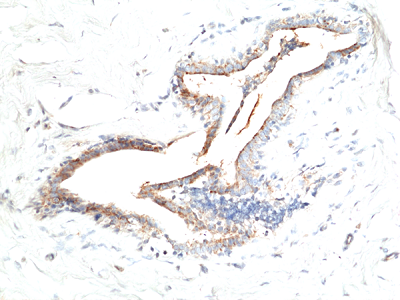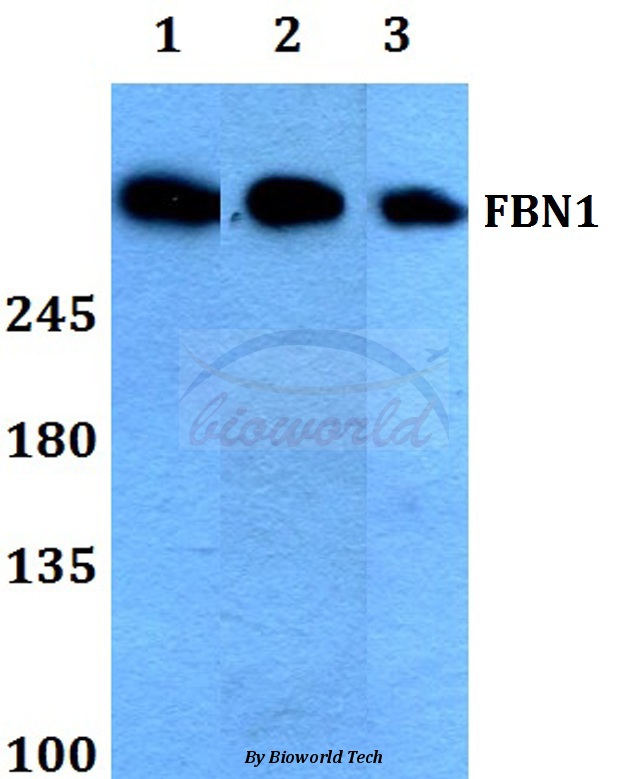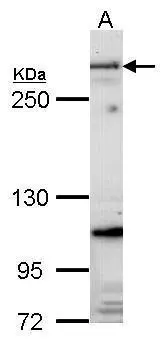
anti-Asprosin, Rabbit Monoclonal (RM463)
REV-31-1355-00
ApplicationsWestern Blot, ImmunoHistoChemistry
Product group Antibodies
ReactivityHuman
TargetFBN1
Overview
- SupplierRevMAb Biosciences
- Product Nameanti-Asprosin, Rabbit Monoclonal (RM463)
- Delivery Days Customer2
- ApplicationsWestern Blot, ImmunoHistoChemistry
- CertificationResearch Use Only
- ClonalityMonoclonal
- Clone IDRM463
- Gene ID2200
- Target nameFBN1
- Target descriptionfibrillin 1
- Target synonymsACMICD, ECTOL1, FBN, GPHYSD2, MASS, MFLS, MFS1, OCTD, SGS, SSKS, WMS, WMS2, fibrillin-1, asprosin, epididymis secretory sperm binding protein, fibrillin 15, fibrillin-1 preproprotein
- HostRabbit
- IsotypeIgG
- Protein IDP35555
- Protein NameFibrillin-1
- Scientific DescriptionAsprosin is a new fasting-induced protein hormone that targets the liver to increase plasma glucose levels. Asprosin is the C-terminal cleavage product of the protein pro-Fibrillin-1. Asprosin is secreted from white adipose tissue and increases hepatic glucose production by using cAMP as a second messenger, leading to activation of protein Kinase A. Reduction of Asprosin levels protects against metabolic syndrome-associated hyperinsulinism. Asprosin may act as a circulating hunger signal. Indeed, peripherally injected recombinant asprosin can cross the blood-brain barrier and intracerebroventricular (i.c.v.) injection of recombinant asprosin stimulated appetite in wild-type mice, indicating a central mechanism of action. Loss of Asprosin in mice and human leads to decreased fat mass and body weight, and hypophagia. Mice are also completely protected from the development of diet-induced obesity. Asprosin works by stimulating the orexigenic AgRP+ (Agouti related neuropeptide) neurons via a cAMP-dependent pathway and by inhibiting the anorexigenic neurons POMC+ (pro-opiomelanocortin) neurons in a GABA-dependent manner. Mutation in Asprosin in human leads to the pattern of metabolic dysregulation, including partial lipodystrophy, accompanied by reduced plasma insulin. Due to its key role in food regulation, Asprosin function could serve as a potentially unique therapeutic target against obesity, diabetes or metabolic diseases. - Recombinant Antibody. This antibody reacts to human Asprosin. Applications: IHC, WB. Clone: RM463. Isotype: Rabbit IgG. Formulation: Liquid. 50% Glycerol/PBS with 1% BSA and 0.09% sodium azide. Asprosin is a new fasting-induced protein hormone that targets the liver to increase plasma glucose levels. Asprosin is the C-terminal cleavage product of the protein pro-Fibrillin-1. Asprosin is secreted from white adipose tissue and increases hepatic glucose production by using cAMP as a second messenger, leading to activation of protein Kinase A. Reduction of Asprosin levels protects against metabolic syndrome-associated hyperinsulinism. Asprosin may act as a circulating hunger signal. Indeed, peripherally injected recombinant asprosin can cross the blood-brain barrier and intracerebroventricular (i.c.v.) injection of recombinant asprosin stimulated appetite in wild-type mice, indicating a central mechanism of action. Loss of Asprosin in mice and human leads to decreased fat mass and body weight, and hypophagia. Mice are also completely protected from the development of diet-induced obesity. Asprosin works by stimulating the orexigenic AgRP+ (Agouti related neuropeptide) neurons via a cAMP-dependent pathway and by inhibiting the anorexigenic neurons POMC+ (pro-opiomelanocortin) neurons in a GABA-dependent manner. Mutation in Asprosin in human leads to the pattern of metabolic dysregulation, including partial lipodystrophy, accompanied by reduced plasma insulin. Due to its key role in food regulation, Asprosin function could serve as a potentially unique therapeutic target against obesity, diabetes or metabolic diseases.
- ReactivityHuman
- Storage Instruction-20°C,2°C to 8°C
- UNSPSC41116161







